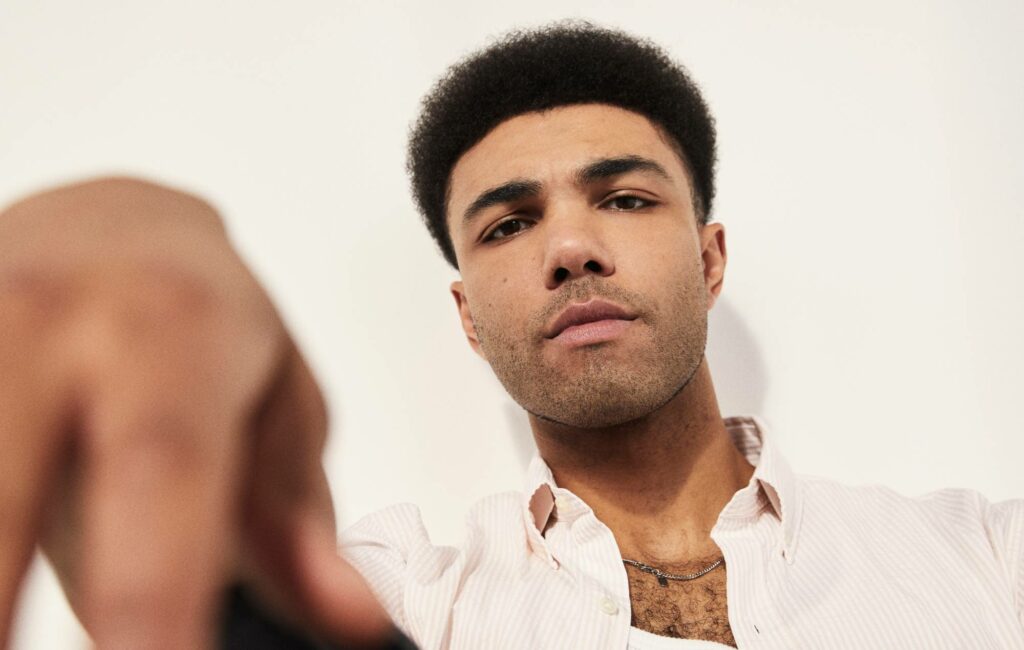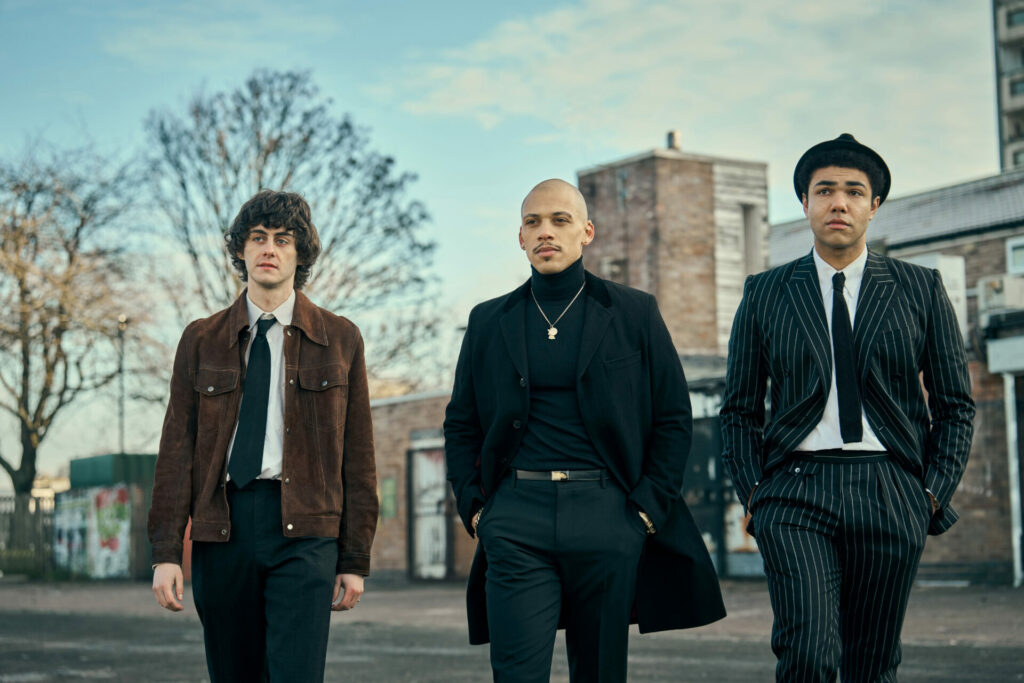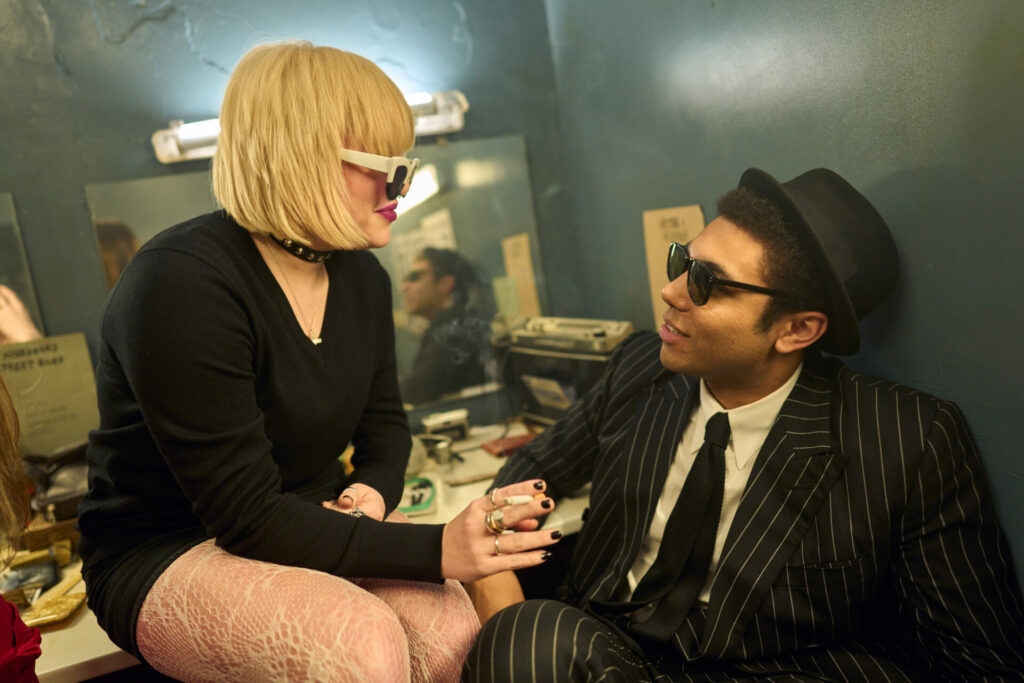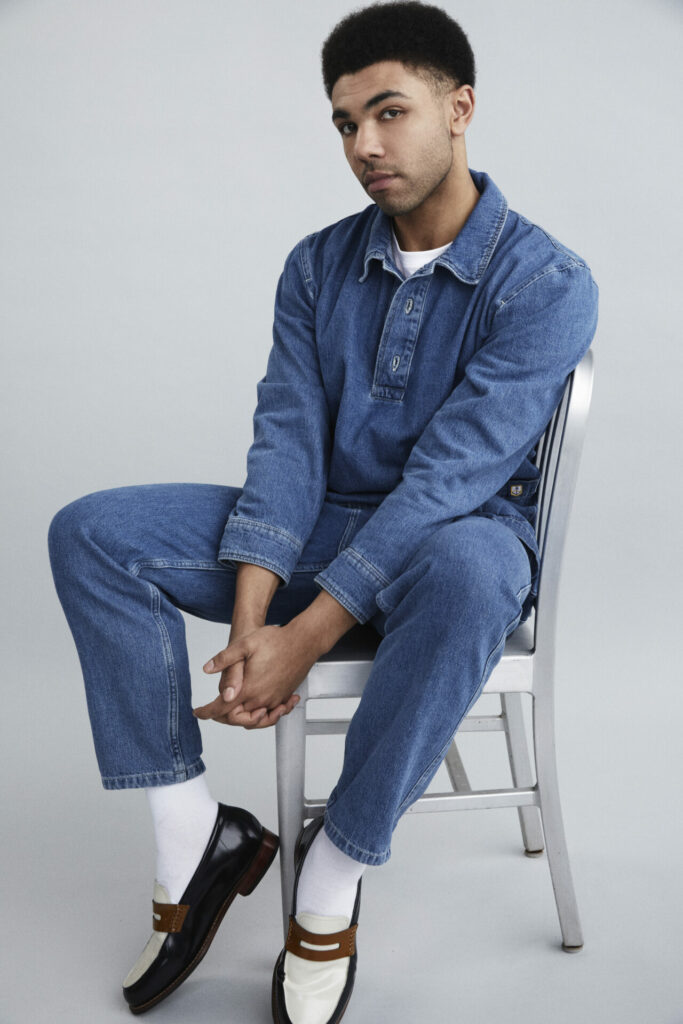This Town’s Levi Brown: ‘This show feels perfect for me’
As This Town prepares to air on BBC this weekend, star Levi Brown tells Rolling Stone UK about his lead role in Steven Knight's latest love-letter to the Midlands.

“I suppose, like a lot of actors, I wasn’t really good at pretty much anything else.” Levi Brown smiles confessedly as he recounts his path into acting across Zoom. A self-confessed naughty child at school, his behaviour was quickly nipped in the bud by a little real talk from his drama teacher (who he still meets up with each year) who explained that drama is to be taken seriously – that it’s something you can actually do for work. “We’re both kind of shocked that it worked, actually. That day, just pulling me aside and giving me a bit of a telling off changed the course of where I was heading.”
The 28 year-old grew up in a small town that “no one would know.” “I don’t even think if you Googled that it would come up”, he muses, settling for Birmingham, or more broadly, the West Midlands, if anyone asks. For those who *do know* the area, it was Halesowen – a town around 7 miles from the city. For him, music has always been a big deal. “Music stories, stories about music have always resonated with me,” he says, and it’s no wonder given the rich musical heritage of his home county; the mid 70s’ Two Tone boom, a genre which fused the 50s and 60s ska sounds brought to the UK from the Caribbean through immigration with the tightly wound attitude and DIY ethos of UK punk, and influenced an effortless unity amongst the youth.
“Even if you weren’t into ska in Birmingham,” he says, “If a Specials song came on or if a Beat song came on, you would recognise it because it’s played everywhere.” He cites Shane Meadows’ This Is England as one of his favourite films growing up due to its soundtrack being comprised of the music that he knew and recognised, a soundtrack which featured the aforementioned Specials, along with the likes of Soft Cell, Dexy’s Midnight Runners, and U.K. Subs, that just “lifted scenes off the ground.” So, when he got his hands on the script for This Town, the latest BBC drama from Peaky Blinders creator Steven Knight, it felt “almost too good to be true.”
Set between Coventry and Birmingham in 1981, This Town is Knight’s latest love letter to the midlands and an ode to the unifying power of music. It charts the paths of four young people as they collectively form a band against the tumultuous landscape of early 80s Britain – the riots, recession, racial tension – as a means of a lifeboat whilst navigating teenage life and reckoning with their own identities and destinies. Newcomer Brown takes on the lead role of Dante Williams, a college student and aspiring poet, seemingly out of step with the rest of the world at a time when visual identity is vital. “I think it was really fun to play to play someone whose rhythm is just completely different to everyone else’s,” he says of the character.

For Dante, music comes to him as a means of carrying his words, and, throughout, is pivotal. With a ska heavy soundtrack, the show also dips in to New Wave, Two Tone, reggae and punk. A careful curation and a comprehensive musical guide as to the general mood, burgeoning youth cultures and politics of 80’s Britain. “When I first read This Town,” Brown recalls with a palpable enthusiasm, “Steve [Knight] would write in what songs he would want in transitions and what songs he would want over certain scenes. I’d get the songs up and listen to the songs as I was reading the scenes and it just elevated it and got me really, really excited. It’s actually really mad that something like this came my way because it almost feels perfect.”
Ahead of the show airing on BBC, Brown sat down with Rolling Stone UK to dig a little deeper into the show’s themes, music and working with Steven Knight. Read the full interview below.
Having grown up in the West Midlands area, were you familiar of the music and the movements, particularly of the Two Tone and ska scenes and their significance in those areas?
I grew up, I mean, my parent’s generation, that was their music, that was their thing. My dad and my mum both listened to completely different genres of music. My dad will listen to heavy metal, reggae, dub, electronic, and then my mum would listen to nineties hip hop, R&B, Soul, but they both listened to ska. So that was something that would be in both households. It was a big deal. Even if you weren’t into ska in Birmingham, if a Specials song came on, or if a Beat song came on, anything like that, you would recognise it because it’s played everywhere and you only realise that later on. But people of my age would only realise that later on when they’re in the pub drinking and, and then all of a sudden a Specials song comes on and we all know the words and we’re like, ‘How?’ Like ‘What?’ You know, ‘How do we all know the words to this song?’ And it’s just because it’s embedded into that city and into the Midlands. When I had my first car, I only had a CD player and the first CD I ever bought was the greatest hits of Madness and that was the only CD that was in my car for the first three months of having it. So yeah, I’d say I have a pretty good idea of it.
When I spoke to Steven [Knight] we talked about the sentiment of Two Tone and how simple it was, uniting Black and white youth together, and how it happened so effortlessly. Do you think that music still has that ability, or will we see that in music again?
I think back then it was so big because back then music was an identity. You were kind of defined by your fashion and your music taste. And there was so much social tension and so people made, you know, people literally made punk because they were so pissed off. They just made this genre of music that just said that. And then I suppose Two Tone happened because, so naturally, out of all this, people having that those identities. There were also a group of people who just wanted to play music and sort of bring all of that together, which ended up, yeah, I suppose, back then as well, Black people and white people being in the same clubs, you know, maybe at the start might’ve been a bit weird, but then I spoke to my dad about it and he said it was just normal. It wasn’t really a thing in those days. And now I think it just happens like all the time.

Like, I went to a Kendrick Lamar gig, I think a couple of years ago or last year, and everyone was there. It wasn’t just you know, it wasn’t just a load of people that just listened to rap music and only listened to Kendrick Lamar, it was people that listened to all sorts of things, you know, it was white people, Black people, Asian people. So yeah, I don’t think it’s as much of a thing now, and maybe there will be something that comes out that just kind of makes everyone go, ‘Oh, my God, you can’t not like this. This is something that is speaking for us’. And I do think we’re in a time now where maybe one song could do that or maybe a new genre will be born out of it. But I don’t know… you never know with music. You never know. And that’s why it’s so bloody great.
Having that resource of your parents growing up around the time and place that the show was set, were you able to draw on their experiences of what was happening socially and politically to get you into that headspace?
I didn’t talk to them that much. I think there was something inside me where I didn’t want to go to my parents for help with my work. So I was like, ‘I could do this on my own. I don’t need you guys!’, but I think my dad just kind of wanted to talk about it anyway, so he would give me some stuff, you know, because I did ask him, like we just spoke about, ‘What was it like when it came to different groups mixing with each other?’ And, ‘When you went to a ska or Two Tone gig was it mostly white youths or was it a mix? Was it a genuine mix?’ Because I think you know, we get told that it was a genuine mix but you don’t know unless you were there. And he said he said it was a genuine mix. It was both. It was a mixture of all types of people and I suppose, like the social tension at the time, my dad was kept in quite a lot so he didn’t see much of it. But yeah, I think they both lived through that time quite, I wouldn’t say under the radar maybe, but, it wasn’t as big of a thing. And so I had to go elsewhere for that kind of information and that bit of research.
There’s a scene where Dante is getting dressed in a suit by his dad for a funeral and it feels really important to the narrative because it’s the first time that he’s getting caught up in this world of visually representing something. It’s remarked a couple of times that he looks like a proper Rude Boy. What do you think that moment and that suit represents in the story?
Yeah. Well he says, doesn’t he, he says when he puts on the hat he feels like dancing. And I think dancing for him doesn’t just mean dancing to a song. It means living life and getting into trouble. And it unlocks something in him. I think the suit does something, definitely. And I think wearing that suit makes him feel, I mean, there’s something about it belonging to his dad and being passed down to him that kind of gives him this power and this sort of this confidence. But the hat especially is something that just completely changes him. And the fact that also, you know, it’s something that he said that [a close family member] would have liked, you know, his dad says this is something [she] would have wanted you to wear and she wants you to get out of the box.
So, yeah, I think that suit, it just unlocks a whole different side to him without taking away the sort of things that he still believes are important, you know, the things that… it actually kind of enhances them. The things he finds important, like his poetry and words and music. It almost gives him sort of license to go out and share that with people. He’s got the look now it, it matches – I’m only having this realisation now – it kind of matches his brain in a way. His creativity, you know, because that duffle coat aint doing bits for him!
I’m a fan of the duffle coat. I’d wear that duffle coat!
I mean, I hope it starts some kind of trend of something. People walking around in Dante duffle coats! But I think that is potentially something that is worn for quite a while and that he wears religiously and then all of a sudden his dad’s put this stush little suit on him and he doesn’t look like himself, you know, he says he looks himself in the mirror and he’s like, that’s not me. But very quickly realises that actually, you know, maybe this could be me.
His nature up until that scene particularly is… you can’t get a sense of whether he’s so intelligent, so naïve or maybe recklessly confident. We see him so composed in all these situations that should have people as a bag of nerves, whether that’s being held by the collar by a gangster, talking to his crush, or at a funeral, so firstly, where does that composure come from?
It’s really difficult. Even now, taking a step back and looking in it’s… with the naivety… he’s a troubled young man and he’s living in a very chaotic world in a chaotic time. Looking into young people back then I realised quite a lot of them just had to, especially working class kids, just had to grow up so quickly. And even though he can be seen as naive, I think a lot of it is actually just the fact that he has such a passion for his beliefs and he has such a direct thing where in he feel he knows what is important and he knows what he thinks can change the world and what actually people need to do to change the world and how they need to act. And I think he expresses that through his poetry. And I think because he has such a focus on what he believes is important, that can be seen as naive, I think, because if someone was, for instance, if someone was to ask him, you know, do you want to come with us to the riots? I think he would have said no, but I’ll write a poem about it and maybe you can take that and show one of the policemen.

The thing is with Steven’s writing is that you have to just go with it. If you think about it too much, then you will start, I think maybe working too against it. His writing is so, you know, it can throw you here and there and you sort of have to just go with it and trust that the work that you’ve done is going to hold up and kind of meet the writing in a place. So, yeah, I don’t what it is. I don’t how… he just does it. One minutes he’s talking to a gangster, the next minute he’s talking to the love of his life. It’s so fun to play but it’s really hard to sort of put your finger on it and how to articulate it, I think.
How important is love as a theme to the show and to Dante because there’s something about his character and how, throughout everything, he’s on a mission to write a song to get the attention of the love of his life?
I think, the message of love – that’s a great headline – the message of love is like a throughline. I think particularly in Dante’s storyline. When we first meet him, he’s in love and then, throughout, it sort of changes. His love changes constantly. You get to witness the love for a for a girl, and then you get to witness a love music and then a love for another girl and then again for music and it’s sort of yeah, it’s sort of just it’s just dark wood for him.
Back then there was a lot of noise, there was a lot of noise and there were a lot of reasons to be pissed off and to be unhappy and to be not content with where you’re at, especially for working class. It just felt like, back then, everything was against you. If you don’t do something about it, you’re going to end up like everyone else and you’re going to end up… it’s bleak, but you’re going to end up doing things that you don’t want to do, ending up in jobs that you don’t want to do just because you’ve got to make ends meet and also because people have told you that that’s the way to do it. And I do think there is still that about now. And I do think that to do your own thing and to, as a teenager or as a young person back then and now, to do your own thing is terrifying. To go against the advice of like older generations or to go against the advice of your peers is absolutely terrifying. And especially when there’s so much going on that is outside of your control that is saying we’re in trouble at the moment.
And I think the naivety is, you know, it’s Dante is aware of all that, but I think he just chooses to ignore it. I think he chooses to not take part in it because, yes, there’s something about fighting for your rights and there’s something about fighting for what you believe in. But then I think there’s also something about doing your own thing and going against it and being, sort of, punk in a way. Punks will fight for their rights, but then I think Dante is like the ultimate punk. He doesn’t even fight with the punks. He just goes off and does his own thing and completely ignores the chaos around him. And I think there’s people that, you know, do that now. But, I think it’s scary. It’s hard to ignore the noise and to kind of drown it out. Some people can do it and some people can’t. To bring it back to Dante, to what he’s doing, he finds it quite easy to drown it out but I think he’s trying to push the people he loves and in his circle around him to also do the same thing. But it’s a bit harder for them.
Do you have a favourite song that was composed for the band in the show?
My favourite song is ‘A Farewell to Matty and her flowers.’ I won’t go into too much detail about where it came from, because I suppose that would be a spoiler, but it’s one of the first songs I ever listened to. I think it was actually the first song I listened to. We had Dan Carey and Kae [Tempest] working on the songs for us, and we got sent them in little files and this was one of the first things I think I started with was, I’d get up really early and then go and listen to the songs in the park or something. And ‘A Farewell…’ was one of the first ones I ever listened to, and the lyrics are just so beautiful and the beat is amazing and, yeah, it’s a really good song without spoiling too much.
Do you find it difficult to exit a world that you’ve kind of been a part of when working on such a big project like this?
Yeah, it was quite hard. It was seven months and coming out of it was a bit of a shock to the system, but it was quite nice to also have been able to look at it from afar and kind of go, ‘Oh, okay, there’s a thing that I did.’ And then it was straight back to working as in like, you know, auditioning and stuff. And now I’m in a play. I’m in Macbeth back with Ralph Fiennes and Indira Varma playing the titular roles of Lady Macbeth and Macbeth. We’re in London now until the 30th March, I think and then we’re off to Washington with it for a month, which will be really fun. We actually go a few days just after the show is released. So, yeah, it’s going to be pretty mad being in America while everyone’s watching it [This Town].
They’re two quite different worlds to inhabit in such quick succession!
Crazy! But is also, is interesting because I mean, you know, I’m not going to call Steven Shakespeare, but his writing is very… Steve’s writing is very rhythmic and very poetic. And, you know, it has a sort of heartbeat to it, it has a rhythm. When you speak it, you kind of feel that if you don’t stay on it, it will not make sense or it’ll sound shit. And that is exactly the same in Shakespeare. But Stephen is not Shakespeare.
There’s the headline!
Yeah! ‘Levi Brown says that Steven is not Shakespeare.’ But he is very, very good.
All episodes of This Town will be available from 6am Sunday 31 March on BBC iPlayer, the series begins on BBC One at 9pm that evening
